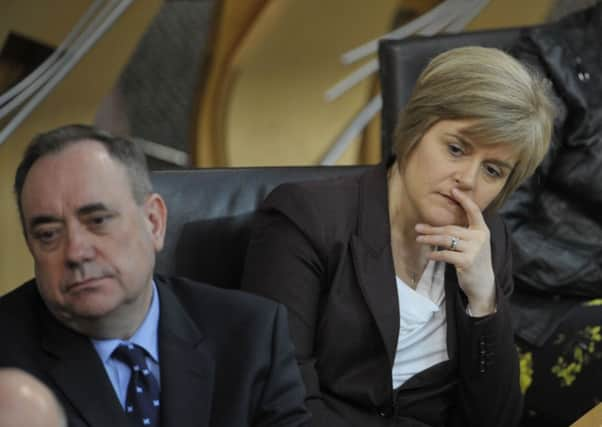Lesley Riddoch: Alex Salmond’s political legacy


So Alex Salmond is standing down. The man with more comebacks than Frank Sinatra is finally exiting the political stage – and there’s no doubt he really is leaving this time. Some may consider this an ignominious end to a career that made the SNP electable, the Scottish Government trustworthy and the prospects of independence credible. But surprisingly, there is hardly a feeling of defeat about it. Perhaps that speaks to the fondness adversaries can suddenly feel when old rivals depart. Perhaps that’s because the half-man, half-monster figure deliberately created by lacklustre political rivals was always a wild exaggeration. Salmond is considered personally charming, politically skilful and a master of the despatch box. His personal approval ratings in recent opinion polls have been bettered only by his anointed successor, Nicola Sturgeon. But there is another factor. A strange feeling of inevitability about the whole announcement.
Salmond recently said he was prepared to go if his persona was becoming an obstacle to independence. Informally, it was said he looked forward to spending more time playing golf. Clearly Nicola Sturgeon played a leading part in the lead up to the referendum poll – a clear knockout winner in debates against Scottish Secretaries Michael Moore and Alistair Carmichael in a way Salmond didn’t initially manage to repeat with Alistair Darling. The narrative about leaders is that they always want to cling to power. The story about Alex Salmond was that he, more than any other leader, was a tyrannical leader – a one-man band. That was never true.
Advertisement
Hide AdAdvertisement
Hide AdThe surprise about his speedy departure matches the unexpected scale of defeat.
The day before the vote, rumours of a 6 per cent Yes lead were circulating. What happened? Why did SNP private polling, so accurate in party elections, prove inaccurate with the indyref? Did the week of scare stories erase the 51 per cent opinion poll lead or was that a rogue poll – did the lead never really exist?
All these big questions and seismic movements in formal politics obscure another reality. The SNP campaign which began the independence campaign was transformed into a genuine grassroots movement during 2014. Thousands of previously uninvolved Scots have entered a world of greater awareness, involvement and readiness to act in the political arena thanks not to the SNP, but to the Radical Independence Campaign, National Collective, Women for Independence, Business for Scotland and Common Weal. That informal, social media-oriented, left-green movement is a significant legacy of the campaign – and its allegiance and future shape is yet to be decided.
Labour, the SNP and Greens will be acting over the next few days to attract those doughty new activists. The campaign groups will take slightly longer to decide their own next moves.
In life, as in politics, when one door closes another door opens.